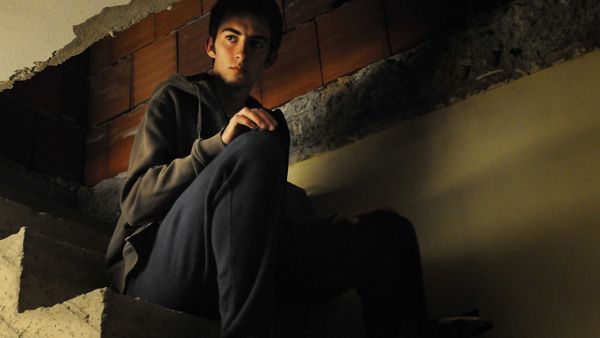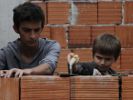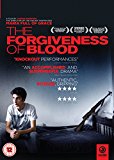Eye For Film >> Movies >> The Forgiveness Of Blood (2011) Film Review
The Forgiveness Of Blood
Reviewed by: Jeff Robson

A country pathway is blocked by a barrier of stones and thorns; an exchange of ritualised insults in a bar escalates into the threat of violence; a family row is abruptly halted by a rifle shot punching out a window.
Welcome to the world of the ‘Kanun’ – a medieval code of honour and justice that still holds sway in modern-day Albania and provides the dramatic core of Marston’s taut and powerful second feature.

It centres around two teenagers – Nik (Halilaj) and Rudina (Lacej), whose father (Abazi) runs a horse-drawn bread delivery service in their small, isolated community. Rudina is a bright girl, constantly chatting to Dad about her latest science project; Nik is moody and slightly dreamy, his life revolving around fixing motorbikes with his best friend, earning enough to turn a vacant shopfront into a computer repair store and diffidently courting his pretty, popular classmate Bardha (Hasaj).
But the family is involved in a long-running land dispute with a neighbouring clan. And when the low-level threats and obstruction that the children have grown up with turn into violence and murder, their father goes into hiding and the Kanun kicks in. Nick, his seven-year-old brother and every other male member of the family is confined to the house, literally on pain of death, until the dispute is resolved and honour satisfied.
Faced with such outdated absolutism on top of the normal, universal growing pains, Nik reacts badly. He chafes at his constant confinement (which he knows from the experiences of other families could last for several years). He misses his girlfriend and his mates. And he’s torn between defending his father’s reputation and becoming increasingly resentful of the trouble caused by Mark’s refusal to throw himself on the mercies of the modern legal framework that ostensibly governs the community.
Rudina, meanwhile, is naturally aggrieved at having school replaced by the drudgery of rising at dawn to hook a skittish horse to a rusty van and lugging boxes of bread around the local farms and shops. But she grows to like her new-found status as the family’s provider, unthinkable in any other circumstances, and develops some entrepreneurial sidelines – notably providing cut-price cigarettes to a population who get through the gaspers in industrial quantities.
But the threat of violence, even towards female ‘non-combatants’, and the constant undertone of rumour and gossip about the circumstances of the murder, take their toll on the relationship between Nik and Rudina, and the fabric of the family as a whole. When an attempt by a professional ‘mediator’ to offer his services – at a price, naturally – is rebuffed by the family elders on the grounds that “we can handle this ourselves,” Nik becomes so frustrated by the glacial pace of the conflict resolution process that he decides to take drastic action off his own bat – even thought it may cost him his life...
It would be tempting to turn this kind of subject matter into a bloodthirsty, plot-and-action driven thriller. But Marston’s decision to focus on a character study of the two teenagers and the impact on their lives of an archaic convention that they (like most of the village) struggle to understand pays dividends. The audience shares their sense of bewilderment and dislocation and because the violence is largely kept offscreen when it does occur – the rifle attack on the farm, Mark finally losing patience with his son and Nik’s final confrontation with the rival family – it’s all the more intense and unsettling.
The performances are universally excellent, with Halilaj – a novice discovered by Marston and Murataj when they auditioned local schoolchildren – a particular standout. He vividly conveys the stroppiness and selfishness of the eternal teenage boy (a scene where he leaves the living room floor covered in wet cement while fashioning a home-made set of weights provides a rare moment of comic relief) but it’s hard not to sympathise with his sense of loneliness and divided loyalties. A scene where he gazes at the metal shutters on his beloved shopfront perfectly symbolises the destruction of a simple, innocent ambition by the particularly harsh realities of his everyday world.
The screenplay deservedly won a Silver Bear at last year’s Berlin Film Festival, taking the audience to the heart of a culture at once markedly different and universally familiar. Marston (whose acclaimed debut Maria Full Of Grace was a similar immersion into another world) and Murataj (an Albanian-born, US-based documentary cinematographer who came on board as a guide and interpreter but ended up as casting director as well as co-writer and co-producer) bring a journalistic tautness and dispassion to a story that could lend itself to melodramatic excess but succeed in getting under the skin of a tight-knit, ritualised community. My only criticism would be that in focusing on character and reaction so strongly, the dramatic impetus of a cracking story is sometimes dissipated.
The striking cinematography by Rob (Red Road) Hardy brings out the beauty of the north Albanian countryside but also heightens the sense of the characters’ entrapment, hemmed in by the dusty dead-end roads and towering mountains. Like Peter Strickland in his striking Romania-set thriller Katalin Varga, Marston has brought an outsider’s keen and fascinated eye to a world that has the trappings of the 21st century – mobile phones, Facebook, imported motorbikes – but retains a mindset that the Borgias and Plantagenets would recognise.
In so doing, he’s created a film that has the tragic fatalism and universal resonance of a Tolstoy short story. Highly recommended.
Reviewed on: 10 Aug 2012

















